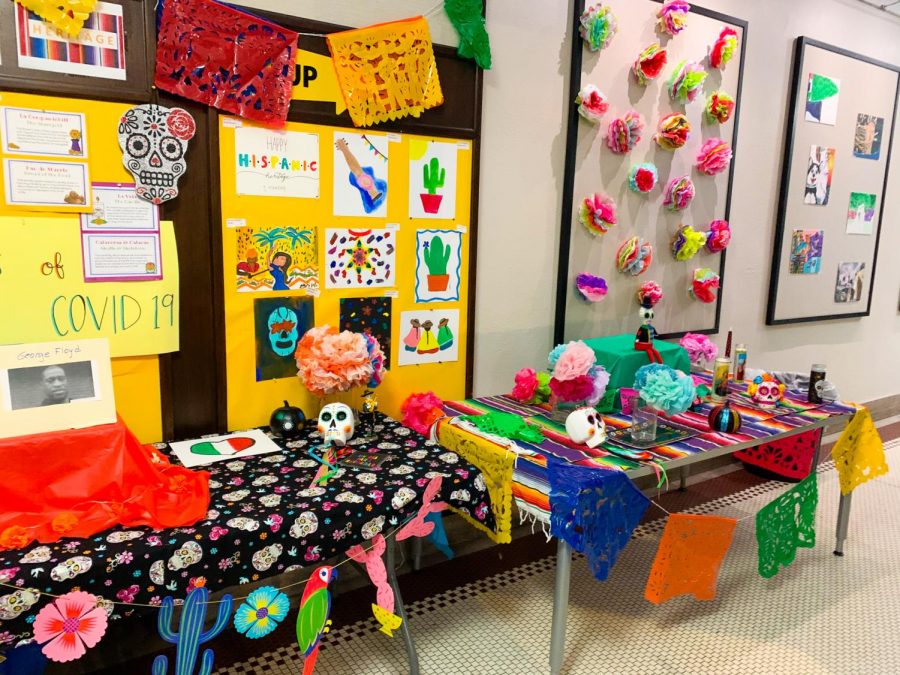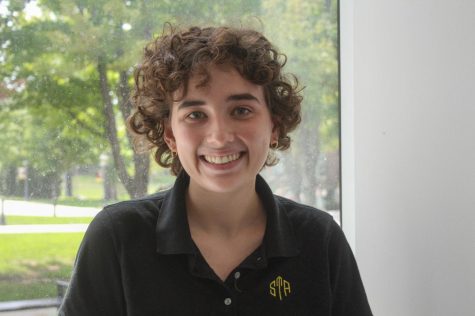Celebrating the Day of the Dead in a year of grief
Community organizations in Kansas City have celebrated the Day of the Dead in past years with elaborate altars and cultural activities, but their festivities have changed shape and taken on a new meaning in the midst of the pandemic.
Many murals, along with Mexican Tissue Flowers, line the walls of M&A Building Oct. 28. These murals and flowers were made by students to show their respect. photo courtesy of Maria Laura Lopez Gonzales
November 21, 2020
Typically, in the weeks leading up to Nov. 1, Mattie Rhodes Art Center’s cultural arts director Jenny Mendez is planning the art center’s biggest event of the year: the Day of the Dead festival. The festival is smaller this year, with five outdoor altars instead of the typical 20 and virtual events to replace the usual community parade and art gallery put on by Mattie Rhodes. However, although the festivities may be less extravagant, Mendez believes that celebrating the Day of the Dead is more important than ever.
The Day of the Dead is a holiday honoring and remembering the dead that occurs over two days, Nov. 1 and 2. It is celebrated mainly in Mexico, and in Mexican American communities in the United States, but also in some other places in Latin America. Its roots are in pre-Columbian Mesoamerican culture, but the modern holiday also includes elements of the Catholic All Saints Day, also celebrated Nov. 1. In a time of international mourning for the victims of COVID-19, it has taken on a new meaning.
“What this celebration really signifies, you know, it gives hope because it talks about death and brings so much more positivity in it,” Mendez said. “We need all the positivity we can have right now with so many people losing their lives to COVID, but then also just the normalcy of death during this time period.”
Many families who have lost relatives to COVID-19 have not been able to hold funerals, leaving them with no space to celebrate their loved ones’ lives. Mendez and her colleagues hoped to provide that space by allowing five local families to create traditional altars honoring their deceased family members. In one case, the patriarch of a very large family passed away early in the pandemic and because only 10 people were allowed at the service, his daughter felt that most of the family did not get to remember him properly.
“You can hear the pain in her voice that she hopes that they still can celebrate him because so many people knew him and so many people wouldn’t want to celebrate his life, you know, in those last moments,” Mendez said. “This gave her an opportunity to at least celebrate him in a way here at Mattie Rhodes so that some people would be able to see and be able to connect with it. So definitely, you know, this is a time when I think it’s most needed.”
The Nelson-Atkins Museum also put on their own virtual Day of the Dead festival, in collaboration with Mattie Rhodes and other community partners. Sara Hyde Schmiedeler, of the Nelson’s education department, is the driving force behind this event. She has helped to plan the festival for several years now, and although the pandemic has impacted her plans for it this year, she has enjoyed finding creative ways to get festivities transferred into a virtual space.
“It’s been a real learning opportunity in addition to, you know, being such a challenging and sad time in our history, but it really has been an opportunity to learn and take on some projects that we all wanted to do,” Schmiedeler said.
The Nelson’s virtual programming includes videos made in collaboration with the Mexican Consulate of Kansas City, Telemundo KC and Mattie Rhodes Art Center, along with a gallery of the famous altars on display at the museum in past years.
“Our [festival] is entirely online in that there’s no in-person program whatsoever,” Schmiedeler said. “And that’s due to our budget limitations and just the COVID concerns about gatherings. Other organizations came up with other really creative ways to approach it, and there’s going to be a Central Avenue drive-thru event coming up and then the Kansas City Museum had free but timed ticketing to see their outdoor altar. So anyway, we really coordinate with our community partners on everything that we do, and this was part of that.”




